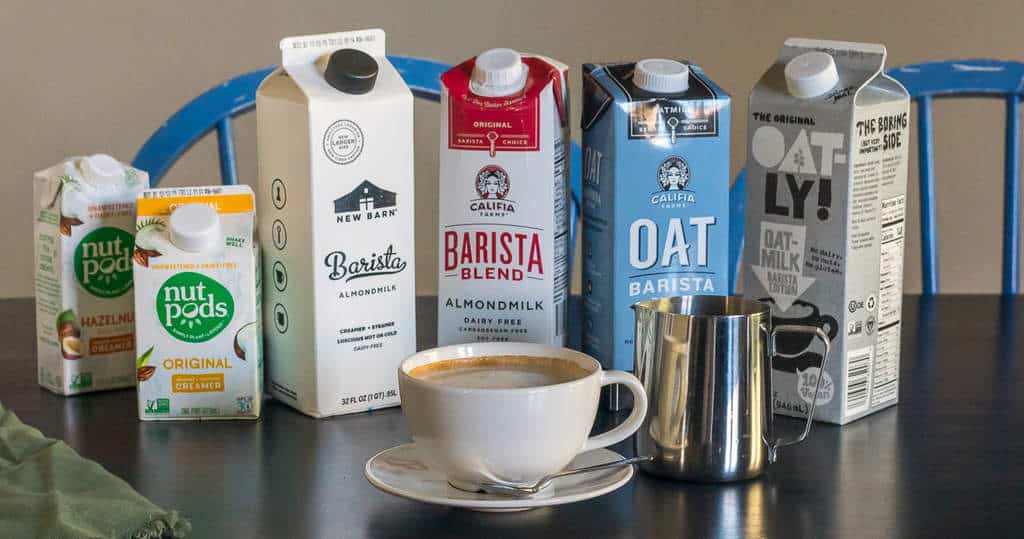
Plant-based milks have surged in popularity as more people embrace vegan diets, have dairy allergies, or seek healthier lifestyle choices. These milks, derived from plants like oats, almonds, and soy, are transforming the morning coffee ritual for many around the globe.
Each type of milk brings its unique flavor, nutritional profile, and performance when mixed with coffee, making your choice a significant part of your coffee experience. Whether you prefer your coffee frothy, creamy, or simply flavored, there’s a plant-based milk to meet your taste and health preferences.
Key Takeaways on Plant-Based Milks for Coffee
- Oat Milk: Stands out for its excellent ability to froth, making it ideal for lattes and cappuccinos. It has a mild, slightly sweet taste that enhances the coffee without overpowering it.
- Soy Milk: A long-time favorite in coffee shops for its creamy texture that mirrors dairy milk quite well. It froths decently and has a subtle flavor that blends seamlessly with the coffee.
- Almond Milk: Offers a nutty flavor and can create a silky foam, although it might separate at higher temperatures. It’s less creamy than soy or oat milk but remains a popular choice for those looking for a low-calorie option.
- Coconut Milk: Known for its thick, creamy texture and tropical flavor, coconut milk adds a rich, slightly sweet touch to coffee. It froths well, making it suitable for more indulgent coffee beverages.
- Pea Milk: High in protein and a newcomer to the scene, pea milk froths well and has a neutral taste that makes it a versatile coffee companion.
- Hemp Milk: While less common, it offers a good amount of omega-3 fatty acids and has a creamy, albeit slightly nutty, flavor.
- Hazelnut Milk: Delivers a robust, nutty flavor, making it a favored option for those who enjoy a strong taste profile in their coffee.
Some popular brands for each type of plant-based milk
Oat Milk:
- Oatly Barista Edition – Specifically formulated for coffee, it froths well and has a creamy texture.
- Califia Farms Barista Blend – Another favorite for smooth frothing and a mild, creamy taste.
Soy Milk:
- Silk Soy Milk – Widely available and popular for its consistent quality and good frothing capability.
- Alpro Soya for Professionals – Designed for baristas, this milk froths beautifully and has a neutral flavor.
Almond Milk:
- Almond Breeze Barista Blend – Known for creating a nice foam and having a subtle almond flavor.
- Califia Farms Almond Milk Barista Blend – Another good choice for coffee due to its creamy texture and ability to froth.
Coconut Milk:
- So Delicious Dairy Free Coconut Milk Barista Style – It steams well and adds a hint of coconut flavor.
- Califia Farms Coconut Cream & Almond Milk Blend – This blend is great for frothing and adds a rich taste to coffee.
Pea Milk:
- Ripple Barista Style – High in protein and designed to perform well in coffee, with minimal separation and good frothing qualities.
Hemp Milk:
- Pacific Foods Hemp Milk – Known for its creamy texture and slightly nutty flavor, it’s a less common but nutritious option.
Hazelnut Milk:
- Elmhurst Milked Hazelnuts – Offers a rich, nutty flavor and is perfect for adding a distinct taste to your coffee.
Analyzing Top Plant-Based Milks for Coffee
Oat Milk
Oat milk is celebrated for its exceptional frothing capabilities, making it a barista favorite for lattes and cappuccinos. Its mild, slightly sweet flavor complements the natural bitterness of coffee without overshadowing it.
This balance makes oat milk a versatile choice for various coffee styles, whether you’re sipping a robust espresso or a mild Americano.
Soy Milk
Soy milk holds a venerable spot in the world of coffee due to its creamy texture that closely mimics dairy milk. It’s a staple in many coffee shops because it not only froths well but also integrates seamlessly with the coffee, providing a smooth, enriching experience. The mild flavor of soy milk enhances the coffee’s taste without altering its fundamental characteristics.
Almond Milk
Almond milk brings a distinct nutty flavor to the coffee mix, appealing to those who enjoy a slight bitterness with a hint of sweetness. While popular, it’s worth noting that almond milk can separate when heated, which might require a bit more attention from the barista to ensure a uniform texture in your drink. Nevertheless, its ability to create a pleasingly silky foam makes it a favorite for many coffee aficionados.
Coconut Milk
For those who fancy a touch of the tropics in their coffee, coconut milk is an ideal choice. It offers a creamy texture and a sweet, coconut flavor that can transform a standard coffee into a more exotic beverage. Best suited for sweeter or flavored coffee creations, coconut milk steams well, adding a lush, frothy layer to any coffee drink.
Pea Milk
Pea milk is gaining traction among coffee enthusiasts who prefer their drinks frothy. It’s rich in protein, which not only contributes to a satisfying texture but also helps the milk to foam up nicely—ideal for crafting perfect lattes or cappuccinos.
Unlike some other plant-based milks, pea milk does not separate easily under heat, ensuring a smooth and consistent blend throughout your coffee. Its mild flavor doesn’t overpower the coffee, making it a subtle yet effective dairy alternative.
Hemp Milk
Hemp milk is a great option for those looking to add a nutritional boost to their coffee. It offers a slightly nutty taste and is enriched with omega-3 fatty acids, known for their health benefits, including supporting heart and brain health.
Although not as common as other plant-based milks, hemp milk is valued for its creamy texture and the slight nuttiness that complements the richness of coffee well, making it a worthwhile choice for those exploring dairy-free options.
Hazelnut Milk
For coffee drinkers searching for a distinctive flavor profile, hazelnut milk is a standout choice. It delivers a robust, nutty flavor that can transform a simple coffee into a more flavorful and enjoyable beverage. This milk is especially suitable for those who appreciate a stronger taste that echoes through their coffee.
While it might not froth as well as soy or oat milk, its rich flavor profile makes it a popular option among nut milk lovers.
Environmental and Health Considerations
When choosing plant-based milks, both environmental impact and nutritional content are significant factors. Oat and soy milk are often celebrated for their sustainability. Oat milk, for instance, requires less water compared to almond milk, which is known for its high water usage. Soy milk also presents an environmentally friendly option, using fewer resources than almond milk.
Nutritionally, these milks vary considerably. Soy milk is typically high in protein, making it comparable to cow’s milk in that regard. Oat milk, while lower in protein, often contains added vitamins and minerals to enhance its nutritional profile. However, it’s important to watch for added sugars and preservatives in some commercial brands, which can detract from the health benefits.
FAQs
Does the type of plant-based milk affect the flavor of my coffee?
Yes, different plant-based milks can significantly influence the flavor of your coffee. For example, coconut milk adds a tropical sweetness, almond milk introduces a nutty flavor, and oat milk offers a mild, creamy taste.
Which plant-based milk is best for frothing?
Oat milk and soy milk are generally considered the best options for frothing. They create a smooth, creamy foam similar to dairy milk, making them ideal for lattes and cappuccinos.
Are there nutritional differences among various plant-based milks?
Absolutely. For instance, soy milk is high in protein, making it comparable to cow’s milk in that regard. Almond milk is typically lower in calories but also in protein. Many plant-based milks are fortified with vitamins and minerals, so checking the nutritional label is key.
Do plant-based milks contain added sugars?
Some plant-based milks have added sugars, especially flavored varieties. Unsweetened versions are available for most types, which are a better choice for those monitoring their sugar intake.
Can plant-based milks curdle in coffee?
Yes, some plant-based milks can curdle when added to coffee due to the acidity and temperature of the coffee. To minimize curdling, try warming the milk slightly before adding it to your coffee, or choose milks that are specifically formulated for coffee use, like barista editions.
Final Thoughts
Choosing the best plant-based milk for your coffee depends largely on personal preference and dietary needs. Whether you prioritize flavor, frothing ability, or nutritional content, there is a plant-based milk that meets your requirements. Consider experimenting with different types to find the one that best complements your coffee and suits your lifestyle.









